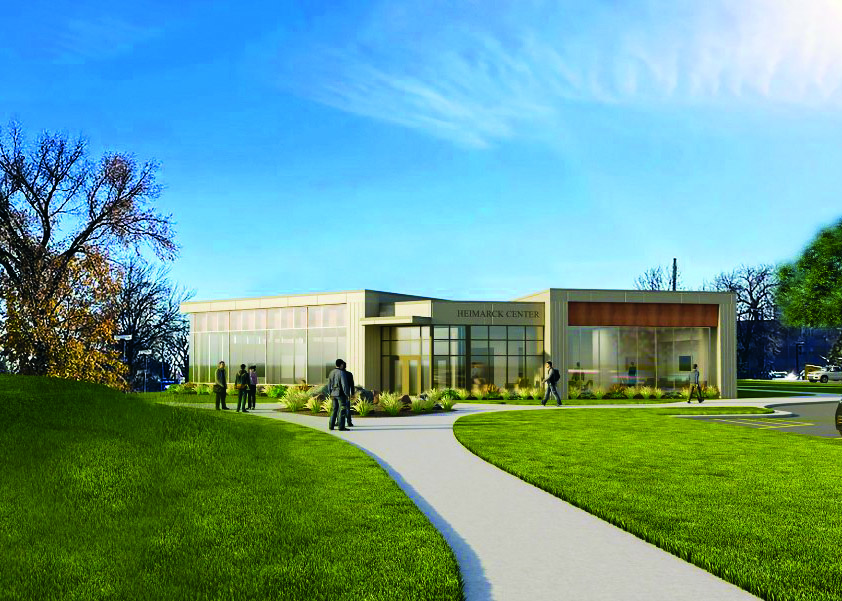
The former Sanford Clinic building will be replaced with the new Heimarck Center. Completion is expected by the fall of 2023.
Nancy Edmonds Hanson
Health science programs are getting a new home, new head and new direction at Concordia College in coming months.
As the former Sanford Clinic on Eighth Street South begins this summer to morph into the spacious Heimarck Center, a Cobber graduate is heading home to lead the Sanford Heimarck School of Health Professions. Gwen Wagstrom Halaas, a medical doctor and leader in innovative programming, returns July 1 to take its reins – helping chart the path toward a more collaborative interprofessional approach to the college’s departments that focus on better health and living.
Gwen’s return to Moorhead as dean of the school from which she graduated in 1975 began with a literal homecoming. When Cobber alums gathered last fall to celebrate their classmates’ career success, she came back to her home town to accept an alumni achievement award from the college. While on campus, Provost Susan Larson filled her in on the redesign of the college’s curricula, then hinted, “We’re going to be looking for a new dean when Dr. Cynthia Carver retires, so keep an open mind.”
“I thought to myself, I’d love that job,” Gwen remembers. Less than a year later, she’s on the way.
Her appointment as dean of the School of Health Professions coincides with a new way of approaching the health sciences, a movement in which she has been deeply involved. Concordia’s departments of exercise science, food/nutrition/dietetics, health-care leadership, nursing and social work have been braided together in one of three recently organized educational centers, along with pre-professional advising programs in athletic training, chiropractic, dentistry, medicine, occupational therapy, optometry, pharmacy, physical therapy, physician assistant and veterinary medicine.
Other courses of study include the School of Arts and Science, which enrolls the bulk of Concordia’s 1,943 students, and the Offutt School of Business.
The goal, she says, is to break down the “professional silos” that isolate professionals in their own fields of practice. “During their undergraduate years, rather than after graduating, is a perfect time to create engagement across the broad range of health professions,” she says. “Here in the U.S., health care has done well at creating health systems that are efficient and effective, but less well at supporting teamwork among all the professions. Other countries have done much better at that. This is our time to catch up.”
The new Heimarck Center – with completion slated for Fall 2023 – has been designed to encourage collaboration between students with different majors. The two-story building on 12th Avenue South across from Memorial Auditorium will have plenty of space for cross-discipline learning. Plans call for state-of-the-art instructional labs – for simulation of in-patient nursing wards and home health settings, with labs for nutrition assessment and human performance – as well as telehealth space and even a health-care leadership boardroom. Its name honors the late Dr. Theodore Heimarck, who established the health administration program in 1966 and continued to lead it and offshoots in health-care finance long-term care administration until his retirement in 1998.
Gwen’s post-Cobber education led her to medical school at Harvard, training as a family practitioner at the University of Minnesota, and the University of St. Thomas, where she earned an MBA in health care. “I worked in biofeedback at the Neuropsychiatric Research Institute in Fargo after college,” she recounts. “Dr. Bill Olson, a neurologist at MeritCare, inspired me to go into medicine.” Interested in psychiatry and the brain, she says she soon discovered a broader fascination: “I liked every part of my medical education – the kids, the adults, counseling, a little surgery. I like variety and I love taking care of the whole family in the context of community.”
She started her own clinic, St. Paul Family Physicians, where she practiced for more than 10 years. But education also was calling; she taught at the U of M and became involved with its Center for Interprofessional Education in 2006 at the Academic Health Center – working with the Colleges of Medicine, Nursing, Public Health, dentistry, pharmacy and veterinary science. She went on to become medical director of Health Partners in Minneapolis and led a rural physicians association before moving to the University of North Dakota School of Medicine as associate dean in 2009, then spending several years as the medical director of Blue Cross Blue Shield of North Dakota.
Her current job at Washington State University’s health services campus in Spokane bears a strong resemblance to what’s happening in the health sciences at Concordia. “We’re just getting started, building an interprofessional learning environment and communicating between programs in a new way,” she says of her two-plus years as vice chancellor for academic affairs and professor in its College of Nursing.”
Yet she adds “I’m thrilled to be coming home.” Both Gwen and her husband, retired Lutheran minister and fellow Cobber Mark Halaas, have Moorhead roots. They have three children, all Concordia grads like Mom and Dad: daughter Liv, teaching Spanish and working on her doctorate at East Tennessee State University; son Per, a student at Luther Seminary in St. Paul; and Erik, who works for the Toaster Innovation Hub at the University of Minnesota. Her mother lives at Eventide in Fargo.
“The most important part of moving,” she says, “is I’ll leave Spokane knowing we have created a sustainable plan to carry on. All the teams are in place and well positioned to make sure the work continues.
“This is the most rewarding work I’ve done. It makes it all fun, knowing that we’re helping health-care workers become even more resilient and innovative.


